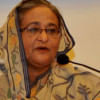A paradigm shift in Sheikh Hasina's development policy
Prime Minister Sheikh Hasina seems to have inaugurated a brilliant chapter in the country's development history by shifting its aid-focused policy to an investment-oriented strategy. I've been inspired by her life-awakening call to domestic and global investors to "grab business opportunities in Bangladesh" through her seminal speech at the Bangladesh Investment and Policy Summit, which started on January 24. The summit doesn't simply give me a picture of a business gathering, but provides prismatic colours that can orchestrate our long-awaited but grossly unattended vision towards national development. The summit theme, as outlined by the Prime Minister, provides the framework, policy and direction of a sustainable development strategy.
Let's have a brief look at economic theory. Most literature on the development of least developed countries (LDCs) like Bangladesh argue that a country can't elevate unless its industrialisation process takes root through a flourishing spree of privatisation which is considered as the gateway of growth and development of the countries all around the globe. Privatisation is, in reality, a component of World Bank prescribed structural adjustment programmes based on notions of economic liberalisation, free trade, competition and limited government intervention. Theoretically speaking, there are thus pro-privatisation and anti-privatisation arguments among many of us. Economists such as Maxim Boycko, Andrei Shleifer and Robert W. Vishny suggest that the theory of privatisation leads to efficient restructuring of firms. Moreover, privatisation is more effective when combined with a tight monetary policy, and when the new owners of firms are profit maximising investors, rather than their employees or even managers.
Although the initial impetus of our privatisation was a result of heavy losses of state-owned enterprises (SOEs), it is now considered an effective economic agenda for sustainable development. This school believes that privatisation stimulates a country's growth by raising the efficiency of the enterprises, creating competition among industrial units, acquiring modern technology, safeguarding the wastage of scarce resources, preventing budgetary pressure, attaining macro-economic stability and above all, keeping pace with the tide of globalisation. Sheikh Hasina's investment-led privatisation model doesn't seem to be based on sole privatisation which, as some critics may warn, leads to old stereotyped capitalism. Nor does it advocate vulgar nationalisation. It moves to the balanced paradigm between the two extremes in which the secret of success of any development effort lies.
Through the investment summit, the organisers as well as the participants are formulating a policy plan and operational strategy of implementing above economic theory. A roadmap of how Bangladesh economy can achieve expected growth from investment-centred industrialisation policy can be of great importance.
The summit has been organised jointly by the Board of Investment (BoI), Business Initiative Leading Development (BUILD), and Prime minister's Office (PMO). The incorporation of all three super-sensitive business organs structures an all-inclusive investment and trade policy that might open up multifarious avenues of investment for business boom. The participation of more than a hundred domestic and foreign investors as well as global financial organisations, such as the World Bank and the International Financial Corporation (IFC), brings an opportune moment for investors to consider the summit as the most appropriate platform to invest in Bangladesh.
However, in order to execute the policies detailed in the summit, the Government of Bangladesh must give attention to eradicate the barriers to investment. First, no investment can be effective in a bad infrastructural condition. Serious government attention needs to be laid on the development of roads, high-ways, transportation, business plants, and economics zones, generation of gas and electricity so on et al. Focusing her policy to that end, Sheikh Hasina has argued that public-private partnership in infrastructure investment offers a new window of opportunity for investors while the existing Export Processing Zones and Special Economic Zones are being expanded for competitive manufacturing in local and global markets. The Prime Minister's declaration to establish Bangladesh Development Authority for the simplification of investment procedure might be an important task ahead. The government plan to set up one hundred economic zones should immediately be implemented in order to create congenial atmosphere for investment.
Second, deteriorating law and order situation of our country poses a severe challenge. The front pages of daily newspapers are splashed with dreadful news of killings, hijacking, robbery, terror attacks, road accidents, traffic jams and traffic congestions due to shutdowns and political demonstrations. The investors – both foreign and domestic – are scared to invest in expensive and long-life projects due to the increasing insecurity and disorder. The public order management, police patrol and intelligence need to go through a major overhaul. Despite a few government steps towards containing terrorism, there is enormous scope to broaden anti-terror preventive measures. Social awareness through radio, electronic and print media can play a very effective role in combating these disorders.
Third, politicisation and political muscle-flexing in achieving undue financial gains from the investors obstruct the smooth process of privatisation. The business stages from license – giving to plant-setting to business operations – all are, on many occasions, dependent some way or the other on political boon. Moreover, the red-tapism and bureaucratic complexities should also be removed. Too many restrictions discourage the investors. Thanks to Prime Minister Sheikh Hasina for her guarantee of security and profitability of investment in Bangladesh. But these utterances have to be substantiated with action-oriented policies and effective implementation.
Fourth, all sorts of tariffs and non-tariff barriers for Bangladeshi investors in foreign countries need to be removed in order to strengthen equal opportunities for both domestic and foreign businesses. Domestic savings - both individual and national - must be encouraged and to that end, citizens should avoid excessive expenditures. It is wrong that we invite and depend on only foreign investments. We must strengthen our own investments through wide-savings so that we can build up solid domestic-foreign collaboration through investments and business.
Last but not the least, Bangladesh should gear up business research and development studies. Mere establishment of Private Sector Development Policy Coordination Committee (PSDPCC) is not enough to meet the demand of research and study for systematic, research-backed and fact-based business operations. According to known sources, around forty thousand foreigners are working in key-executive positions in different manufacturing and industrial sectors. Time is now to prepare our own graduates by providing the required education and training so that they can shoulder the responsibilities of these business organisations. That will check the lawful and unlawful cash outflow from Bangladesh and be a great contributing factor for the investment-oriented growth and development strategies. The opening speech of the Prime Minister Sheikh Hasina will be enshrined in the annals of the history of the sustainable development of Bangladesh.
The writer is a Professor of International Relations, University of Dhaka and currently Dean of the School of Business and Social Sciences, Sylhet International University.
Email: [email protected]

 For all latest news, follow The Daily Star's Google News channel.
For all latest news, follow The Daily Star's Google News channel. 








Comments